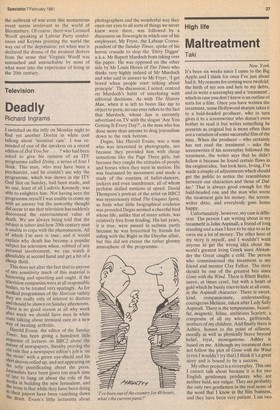Television
Deadly
Richard Ingram
I switched on the telly on Monday night to find yet another Doctor in white coat talking about 'terminal care'. I was reminded of one of the speakers on a recent edition of Did You See . . . ? who had beer1 asked to give his opinion of an ITV Programme called Dying, a series of four I think. This man, who may have been a Psychiatrist, said he couldn't see why the, Programme, which was shown in the ITV .God Slot on Sunday, had been made, and no one, least of all Ludovic Kennedy, was able to enlighten him. Not having seen the Programme myself I was unable to come up With an answer but the unworthy thought did occur to me that television has suddenly discovered the entertainment value of death. We are always being told that the subject is taboo and how 20th-century man IS unable to cope with the phenomenon. All of which I'm sure is true; and it would explain why death has become a popular subject for television when, robbed of any Personal involvement, we can watch it ghoulishly at second hand and get a bit of a Cheap thrill.
This does not alter the fact that to anyone Of any sensitivity much of this material is harrowing and upsetting and ought, if the television companies were at all responsible bodies, to be treated very sparingly. As for medical programmes of the Horizon variety they are really only of interest to doctors and should be shown on Sunday afternoons. There is no good reason at all why week after week we should have men in white coats talking about terminal care or a new Way of treating arthritis. Harold Evans, the editor of the Sunday Times, has been giving a humdrum little sequence of lectures on BBC2 about the nature of newspapers, thereby proving the old rule that a newspaper editor's job is 'on the stone' with a green eye-shield and his shirt sleeves rolled up, and not appearing on tThe telly pontificating about the press. Journalists have been given too much time of late to bang on about the role of the Media in building the new Jerusalem; and vtile irony is that while they have been doing their papers have been vanishing down "le drain. Evans's little lecturette about photographers and the wonderful way they open our eyes to all sorts of things we never knew were there, was followed by a discussion on Newsnight in which one of his employees. Mr Fryer, the Labour Correspondent of the Sunday Times, spoke of his heroic crusade to stop the 'Dirty Digger' a.k.a. Mr Rupert Murdoch from taking over the paper. He was opposed on the other side by Mr Louis Heren of The Times who thinks very highly indeed of Mr Murdoch and who said in answer to Mr Fryer, 'I get bored when people start talking about principle'. The discussion, I noted, centred on Murdoch's habit of interfering with editorial decisions. As with The History Man, when it is left to bores like me to object to porn, no one ever refers to the fact that Murdoch, whose Sun is currently advertised on TV with the slogan 'Are You Getting It Every Day?', is the man who has done more than anyone to drag journalism down to the rock bottom.
Degas, like Harold Evans, was a man who was interested in photographs, not because they provided him with cheap sensations like the Page Three girls, but because they caught the attitudes of people and horses when they were in motion. He was fascinated by movement and made a study of the routines of ballet-dancers, jockeys and even laundresses, all of whom perform skilled motions at speed. David Thompson's portrait of the artist on BBC2 was mysteriously titled The Unquiet Spirit, as from what little biographical evidence was provided Degas seemed a cheerful bird whose life, unlike that of many artists, was relatively free from feuding. His last years, it is true, were passed in sadness partly because he was boycotted by friends for siding with the Right in the Dreyfus affair, but this did not excuse the rather gloomy atmosphere of the programme.






































 Previous page
Previous page